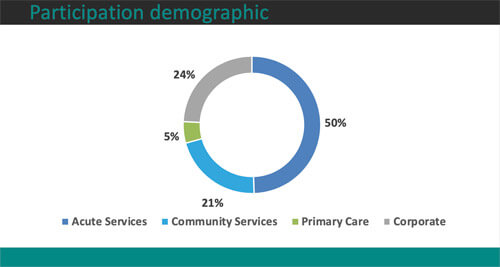The majority of Senior Health Managers want policymakers to prioritise service integration and introduce electronic patient records, according to new research, carried out by the Health Management Institute of Ireland (HMI), Ms Sharon Morrow HMI Council Member and Director of the All-Island Congenital Heart Disease Network told the Conference.

She was presenting the results of the HMI Manager Pulse Survey 2019, which ran from August 27 – September 13.
Survey participants included 166 of Ireland’s most senior officials across the health sector. Fifty per cent of respondents worked in acute care, 24 per cent in corporate services, 21 per cent in community services and five per cent in primary care.
Ms. Morrow said service integration topped the poll, with 64% of participants listing it as a top priority for key policymakers, while nearly 60% of participants highlighted the need for single patient records to be prioritised by health policymakers.
In light of pending changes in the health services, the Council of the HMI had decided that the time was appropriate to undertake a survey of healthcare managers to capture current perceptions on those areas within the service where challenges existed and to identify areas which should be prioritised to facilitate a fit for purpose service.
Retaining the best people and changing work practices were the main people management challenges to emerge from the survey.
When asked which areas should be prioritised by policy makers, 63 per cent opted for service integration, 57 per cent for funding of services, 54 per cent for investment in community services, 40 per cent for investment in ICT, 24 per cent for resolving the present two-tier health system, 19 per cent for regulatory compliance and 10 per cent for the cost of medicine. Sixteen per cent opted for other areas.
There were 25 additional suggestions covering:
- Staff – resources, wellbeing, workforce planning, recruitment, retention, motivation, engagement, resilience, learning and development
- Accountability of staff to provide highest quality services
- Upgrade of capital infrastructure
- Bed capacity
- Ensuring funding linked to catchment area and demographic
- Quality/efficiency of service and environment for patients
- Access to services – addressing waiting lists and times in line with clinical needs
- Improving culture of using evidence based knowledge for decision making
- Introduction of lean and similar methodologies
- Governance
- Health economics
- Access to services
- Over layering of management/corporate managers.
Ms. Morrow said retaining the best people and changing work practices were the main people management challenges to emerge from the survey.
Fifty three per cent of respondents cited retaining the best people and 52 per cent changing work practices as the main challenges. Thirty five per cent listed Performance Management and a similar percentage recruiting clinical staff. Twenty nine per cent said the main challenge was lack of resources to train staff and 29 per cent said motivating staff. Twenty eight per cent said staff engagement, 27 per cent said developing a quality and safety patient culture, 22 per cent recruiting and supporting administrative staff and 12 per cent attendance management.
The ranked priorities for investment in technology were the single healthcare record, updating hardware and software, remote healthcare delivery, data analytics, cyber security and decision support technology.
Seventy four per cent of respondents strongly agreed that our health services emphasised quality in everything it did.
Ms. Morrow said 74 per cent of respondents strongly agreed that our health services emphasised quality in everything it did. Fourteen per cent strongly disagreed.
Eighty three per cent strongly agreed that the health services had strong value around patient care, while eight per cent strongly disagreed.
Sixty five per cent strongly agreed that the health service had a commitment to high levels of productivity. Fifteen per cent strongly disagreed.
Fifty five per cent strongly agreed that the health service stayed up to date with leading age practice. Twenty five per cent strongly disagreed
Sixty per cent strongly agreed that the health services treated everyone with respect and eighteen per cent strongly disagreed with this.
Forty seven per cent strongly agreed that the health services utilised up to date technology. Thirty four per cent strongly disagreed.
The overall perception of healthcare was that it was very strong values in patient care, with an emphasis on quality.
There were issues with lack of up-to-date technology and using leading edge practices.
The Key themes from 143 comments were:
- Training/coaching/development
- More time on staff engagement, particularly front-line clinical
- Better communication with key stakeholders
- Less bureaucracy and more devolution
- More time for planning
- Time management
- Lead innovation and change management
- ICT initiatives and collaboration
- Drive services towards more community focus
- Improved networking to address system leadership and issues.
Commenting on the findings Mr Lorcan Birthistle, President, Health Management Institute said, “It is unsurprising that most senior health managers in the country consider the need for service integration as a key priority. It is evident that this need is best met through a connected electronic healthcare record for every citizen in the country that tracks the patient from Primary Care, to Acute Services, right through to Community Services, which would essentially follow the patient from birth to death.
“While some hospitals are ahead of the curve and have commenced rolling out an electronic healthcare patient record within their locations, the HMI notes it needs to become an urgent priority among policymakers to ensure all healthcare institutions are adequately resourced to seamlessly share patient information.

“A further 55% of senior healthcare professionals said that investment in Community Services needs to be at the top of the Government’s health agenda.
“It is important to invest in Community Services, to adequately equip its staff with the required resources to perform procedures in the community, rather than seeing the current pattern continue where patients present at Acute Hospitals with non-acute complaints, who should in principle be cared for in the Community. This, in turn, will help free-up space and alleviate waiting times in hospitals.”
“The study also revealed the need for Updating of Hardware and Software (14%) as well as Cyber Security (9%) and Data Analytics (9%) were among the priorities of investment in technology in the healthcare service.
“Survey respondents also cited the ‘upgrade of Capital infrastructure and ‘ensuring funding is linked to the catchment area and demographic as areas which should also take precedence for policymakers.
“The findings of the survey mirror the Sláintecare Action Plan 2019 management of services, which highlights how supportive health care managers are about the plan.”

